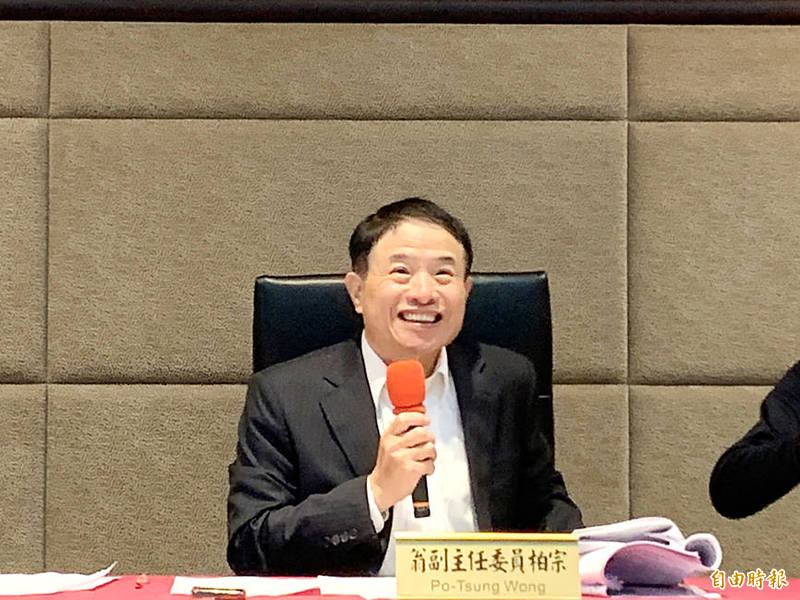《TAIPEI TIMES》 Telecoms fined over scammer activities

National Communications Commission Vice Chairman and spokesman Wong Po-tsung speaks at a news conference in an undated photograph. Photo: Ting Yi, Taipei Times
EASILY EXPLOITED: The commission found that nearly 1,000 of the sets of phone numbers transferred to Strait-Telecom were used by scammers, a spokesperson said
By Shelley Shan / Staff reporter
Taiwan Star Telecom Corp (台灣之星) and Strait-Telecom Co (海峽電信) were fined a total of NT$1.3 million (US$415,973) for failing to authenticate the identities of service subscribers and therefore allowing scammers to take advantage of their services, the National Communications Commission (NCC) said yesterday.
The fines came after the telecom regulator in March issued a fine of NT$4.5 million to Asia-Pacific Telecom Co (APT) for failing to thoroughly check the identities of telecom service applicants, resulting in their phone numbers being exploited by scammers.
Taiwan Star, a mobile network operator, was fined NT$1 million and was asked to submit a report within one month on how it has improved the situation, whereas Strait-Telecom, a mobile virtual network operator (MVNO), was fined NT$300,000, NCC Vice Chairman and spokesperson Wong Po-tsung (翁柏宗) told a news conference yesterday afternoon.
“We were informed by the Hsinchu District Prosecutors’ Office on April 25 that they had found, through an investigation of a case, that a Taiwan Star employee had helped Jui Co (颶翊), a corporate customer, transfer 100 sets of its mobile phone numbers to a third party. Two of the phone numbers ended up being used by scammers,” Wong said.
“Our investigation showed that Taiwan Star did not thoroughly verify the identities of its users, and consequently contravened the Telecommunications Management Act (電信管理法),” he said.
Meanwhile, the Taoyuan District Prosecutors’ Office on June 1 informed the commission that a similar situation occurred at Strait-Telecom, Wong said.
As a MVNO, Strait-Telecom does not own a mobile spectrum license, but still offers mobile services under its brand name using the network of a licensed mobile operator, he said.
“Because of the tip from the Taoyuan Prosecutors’ Office, we launched an investigation and found that Strait-Telecom was a corporate customer of Chunghwa Telecom, which was going to appropriate 300,000 sets of mobile phone numbers for its client to use,” Wong said.
The commission also found that 120,000 sets of mobile phone numbers have been transferred to Strait-Telecom. Among them, nearly 1,000 were used by scammers, an investigation by the Taoyuan District Prosecutors’ Office found.
“We have asked Chunghwa Telecom to suspend the transfer of the remaining 180,000 sets of mobile phone numbers. We have also found that Strait-Telecom’s MVNO license expired on May 27 and its contract with Chunghwa Telecom is set to expire in September,” Wong said.
Strait-Telecom was fined NT$300,000 for contravening the Regulations for Administration on Type II Telecommunications Business (第二類電信事業管理規則), he said.
In other news, EMAG Technology was fined NT$1.3 million for illegally importing an uncertified Chinese gaming smartphone into Taiwan, the NCC said.
The company, also known as MiClub, in March launched a fundraising plan on FlyingV — a Taipei-based fundraising platform — to import the RedMagic 8 Pro into the country.
However, the Telecommunication Management Act stipulates that, to maintain the order of radio waves, controlled telecommunications radio frequency devices can only be manufactured or imported from other countries after securing approval from the NCC.
The act also stipulates that only controlled telecommunications radio frequency devices that comply with Taiwan’s technical specifications and pass relevant inspections can be sold domestically.
Smartphones are controlled telecommunications radio frequency devices as the communication proceeds using 4G or 5G mobile technology, the commission said.
“EMAG Technology was fined NT$650,000 as it contravened Telecommunications Management Act for illegally importing and selling of Redmagic 8 Pro smartphones,” it said.
“The company’s chief executive Hsien Cheng-yu (謝政宇) knew about telecom regulations and insisted on importing and selling the device in Taiwan,” Wong said.
“The commission then ruled that Hsieh be given the same fine as imposed on the company, as per the Administrative Penalty Act (行政罰法),” Wong said.
The company was asked to submit a plan to rectify the situation within one month, Won said.
新聞來源:TAIPEI TIMES















